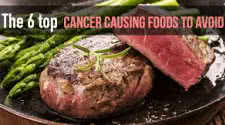Colon Cancer you Diet: Diets High in Simple Sugars Linked to Colon Cancer

Find out what YOU eat for optimal health
Insulin is a highly anabolic hormone that speeds the rate at which amino acids enter the cells and increases protein synthesis. High insulin levels
create an environment conducive to colon tumors. Diets with a high glycemic index - high in simple sugars - trigger increased levels of insulin.
Researchers from Harvard showed that men, but not women, who eat high glycemic index diets, have an increased risk of colon cancer. Examples of high
glycemic index foods include baked potatoes, table sugar and jam, while lower glycemic index foods include brown rice and cooked corn. The study
examined more than 40,000 women and 51,000 men and followed them for eight to 10 years.
Eating a high glycemic index diet increased the risk of colon cancer three to six times above those who ate diets containing more complex carbohydrates.
Nutritionists recommend that people avoid high glycemic index foods because they can cause large changes in blood sugar and promote obesity, heart
disease and cancer. Eating high glycemic index foods causes problems in the cells and organs, such as insulin resistance, high blood insulin levels, and
poor blood flow regulation. These lead to sexual problems, heart disease, obesity, high blood pressure and high cholesterol. Prevent these problems by
exercising regularly and choosing low saturated fat, high-fiber, low glycemic index foods that take longer to digest.
Some Foods Protect Against Colon Cancer
Some, but not all, studies found that excessive calcium intake may increase the risk of prostate cancer. In the Harvard Physicians Health study, men who consumed two servings a day of milk or other dairy products were 30 percent more likely to develop prostate cancer than those who ate less than 1/2 serving per day. The study examined nearly 21,000 male doctors during the 1980's and '90s.Researchers speculate that the calcium content of dairy food may play a role in developing prostate cancer. Milk may reduce a special type of vitamin D t hat helps protect the prostate. In another study, taking dietary calcium supplements increased prostate cancer risk by 70 percent. Many people take calcium supplements to prevent bone loss and promote weight loss. Rather than cutting out dairy foods from your diet, stick to non-fat and low-fat dairy products and eat foods that reduce the risk of prostate cancer, such as broccoli, cauliflower, tomatoes and tomato products, and fish high in omega-3 fatty acids.